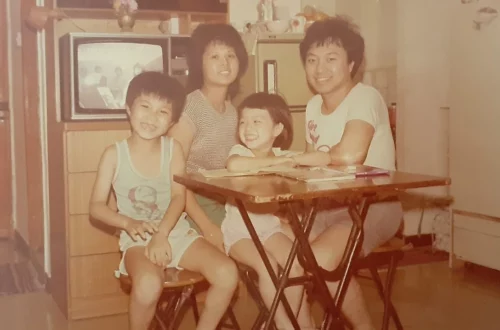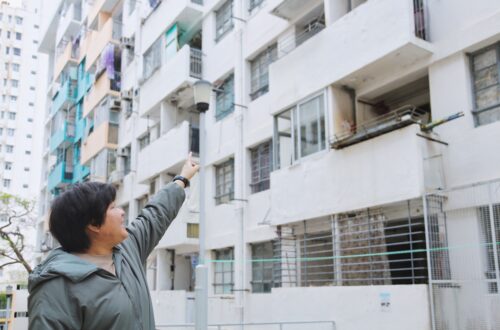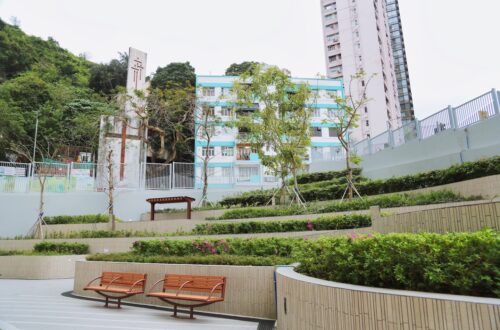Balcony and “After-school Queue”:
Cherished Childhood Memories of the 80s
Pang Men Him / Ming Wah Resident

together at dai pai dongs on Sundays.
Pang Pang was born in a seaside wooden hut in Lei Yue Mun in the 80s. Her father recalled that when typhoons swept across the coast, towering waves taller than their house would crash against the shore; the roof would leak every time it rained. When their application to move into Ming Wah Dai Ha was approved, the family felt like they had won the lottery as they would finally settle into a comfortable home.
Pang Pang was 3 when her family moved into Ming Wah Dai Ha. She enjoyed her unique childhood experiences in the estate. Outsiders may not understand her fondness for the place, but those who have lived here will surely understand her affection.
Having classmates as neighbours
Pang Pang went to St. Basil’s Primary School (later renamed St. Mark’s Primary School) which was a mere 5 to 10 minutes’ walk away from Ming Wah Dai Ha. Since a lot of students lived in Ming Wah, an after-school queue would appear every day: those who lived in Block A would stand at the front, leaving those who lived in Block M at the tail end, and a teacher would then lead the pack to walk back home along A Kung Ngam Road. Since Pang Pang lived in Block K, she was out of the teacher’s sight and could chat freely and make friends with classmates who lived in other blocks. As a cartoon character called Bumpety Boo was popular among kids at the time, classmates and neighbours started calling her Pang Pang, a nickname for the cartoon’s protagonist.
As classmates and neighbours, they knew each other, greeted each other when they met, and helped each other if anything happens. She recalled that on the first day of school one year, while they were lining up waiting to go home after school, a new student suddenly burst into tears. A few students comforted her, “Don’t cry, why are you crying?” An older girl held the crying girl’s hand and escorted her home. “I felt like we were looking out for each other.” In the eyes of the kids, their classmates were also their neighbours.
Moving into Ming Wah Dai Ha from a wooden hut
Back then, though Shau Kei Wan was already somewhat well developed with more and more housing projects being planned, there were still quite a few squatter areas near the hillsides. Fires were rampant and would often destroy multiple homes. Pang Pang had witnessed first-hand the repercussions of such disasters even after moving to Ming Wah Dai Ha: the great fire of Tsin Shui Ma Tau Village (where Yiu Tung Estate is now situated) in 1987. She recalled:“The whole hill was on fire.” Pang Pang saw that one of her classmates came to school in slippers the day following the fire; he had lost his home overnight! “What a pathetic sight! I have never dared to play with fire since.”
Pang Pang and her family felt fortunate to be living in Ming Wah Dai Ha. When staying home, Pang Pang loved hanging out on the balcony. “It made me feel like a rich person. With huge storage spaces, the balcony was well-ventilated and we could grow flowers on it.” The balcony served an additional purpose: it allowed neighbours to talk to each other without having to use a phone. A classmate of hers who lived in the next block once shouted her full name at night. The two kids then waved at each other at the window and shared a good laugh.“When I saw my dad downstairs from the balcony, I would call out to him, and he would wave at me.”
Ringing of tram bells, lion dance gongs
When Pang Pang was 15, her family applied to move to Block G since they wanted to enjoy the comfort of an elevator instead of continuing to climb stairs. After they were rehoused in a flat facing the tram terminus, the rings of tram bells became a constant background sound. “They woke me up all the time. Trams began to run at 5 to 6 in the morning and didn’t stop until 1 to 2 after midnight. It bothered me a lot when I was a kid.”
Talking about Tam Kung Festival that falls on the same day as the Buddha’s birthday, the only thing about the festival that Pang Pang would care about as a high school girl was the rest day that came with it. During the festival, she would often be woken up by the lion dance on the street at around 8 to 9. She watched the Kung Fu demonstrations from her bed unimpressed, only to realise later when she grew up how fortunate she was to have witnessed these culturally significant events. She also missed bus 85 operated by China Motor Bus Company. “Every time after toiling up the slope at Chai Wan Road and turning into A Kung Ngam Road, the bus driver was all hunched forward, turning the wheel as hard as possible.” For years, she relied on this bus service for her daily commute back home at Block G.
In 2021, St. Mark’s Primary School was closed permanently. Before the school’s closure, Pang Pang attended an alumni reunion where she was reunited with her former classmates who had gone their separate ways after graduation. Suddenly she felt as though they were queuing up to go home again and they chattered endlessly. “I wouldn’t have befriended so many classmates if I weren’t living in Ming Wah,” she said. Perhaps it can also be assumed that without these classmates, she wouldn’t have developed such a chatty personality as she has now. She also reconnected with the girl who shouted her name from the next block and they shared a good laugh about what happened all those years ago.

Some of Pang Pang’s elementary school classmates lived on the same floor. She would often peek through the iron gate to see if her friends were home before knocking on the door. If her friends were at home, she would ask them to come out and play.
很多同學都是屋邨街坊,專屬明華的放學小隊十分長龍。-1.jpg-的副本-1-500x330.jpg)
Many of Pang Pang’s (front row, far right) classmates lived in the same estate. A long queue to Ming Wah would appear every day after school.

Pang Pang loved the balcony in her flat. “It made me feel like a rich person. With huge storage spaces,the balcony was well-ventilated and we could grow flowers on it.”

The balcony allowed neighbours to talk to each other without having to use a phone.

Greenery is an additional feature of the redeveloped Ming Wah Dai Ha.

Pang Pang’s home at Block G directly faced the tram terminus; the ringing of tram bells became a constant background sound.
Connection to Ming Wah Dai Ha: Born in the 1980s; living in the estate since 1984/85
細説明華
Ming Wah Dai Ha
Documentary Project
Copyright|Disclaimer | Contact us
Organiser|Hong Kong Housing Society
Collaborator|Dragon Foundation、Lion Head Culture、Hide and Seek Tour
Copyright © 2024 Hong Kong Housing Society. All Rights Reserved.
細説明華
Ming Wah Dai Ha
Documentary Project
Copyright|Disclaimer | Contact us
Organiser|Hong Kong Housing Society
Collaborator|Dragon Foundation、Lion Head Culture、Hide and Seek Tour
Copyright © 2024 Hong Kong Housing Society. All Rights Reserved.